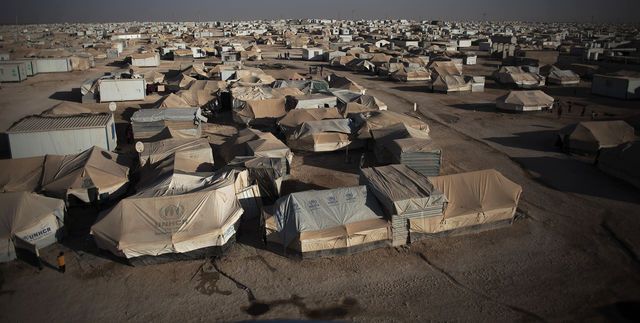Syrians Want End to War, Not Patchwork Solutions – by Joelle Bassoul
World leaders came together in London on Thursday to pledge nearly $11 billion aid to victims of the Syria crisis. But, as Joelle Bassoul of Oxfam writes, while the amount of help promised in London is certainly a positive development what Syrian refugees desperately need, above all else, is peace
Yes – because Syrians were present at the conference. Around 40 representatives of civil society organizations came to London, met on Wednesday, shared their hopes and increasing concerns for the future and came out with a joint statement that their delegates delivered to the donor conference. It was a first, after three years of similar summits. Having Syrian voices heard when the needs of Syrians are being discussed should be a given not a privilege. « We were invited at the last minute. Next time, we want to be part of the planning process, of the thinking behind such meetings, » one of them told me.
Yes – because some rich countries have pledged more financial support than in previous years, and have addressed specific issues such as education and job opportunities for Syrian refugees. World leaders promised a whole generation of Syrian children that their future will not be lost, that they will get access to the basic yet pivotal right to education. Leaders have also promised refugees, and their host governments in neighboring countries, that more than 1 million jobs will be created by 2018. They can’t turn their back on these promises now.
Yes – because aid pledges have gone beyond immediate needs to look into long-term funding, as well as development plans for Syria’s neighbors. Around $40 billion of loans, some concessional, were promised, in addition to the humanitarian aid. This should translate into new schools, improved health facilities, innovative businesses and better infrastructure for millions of people in the region. For these reasons, the London conference is a potential turning point.
But what happened yesterday is not enough to talk about an unprecedented breakthrough.
Nearly $9 billion is required in 2016 to help Syrians in need, in addition to the poor communities hosting them. Less than $6 billion was pledged. This means that many Syrian families will still need to limit their daily meals, and be pushed to remove their children from school to send them to work or to marry their daughters at a young age to have one less mouth to feed. I sat recently in a tent with a family of refugees in Lebanon’s Bekaa valley, surrounded by school-aged children who were trying to build toys with scraps of firewood. When I asked the father why they weren’t in school, he said: « I need to buy them clothes and books, give them pocket money and the transportation fare … Look around you, can I afford it? »
Money shouldn’t be used as a carrot to keep refugees in the Middle East. Lebanon, Jordan, Turkey, Iraq and Egypt are hosting more than 4.5 million Syrians who have fled a deadly conflict, some of them nearly six years ago. Helping these countries to help refugees is a moral obligation on rich governments. Improving the living conditions and respecting the rights of refugees and host communities alike should be the primary aim of the money pledged, not counterterrorism objectives or stopping the flow of Syrians to Europe. Unfortunately, the London conference didn’t address the issue of offering refugees safe and legal routes to countries beyond the region.
Oxfam calls on rich countries to pledge the resettlement of 10 percent of the total number of refugees by the end of 2016. That is around 450,000 of the most vulnerable people, or the equivalent of the population of the Scottish city of Edinburgh or the U.S. city of Atlanta spread over several countries and continents. It is a relatively small commitment by rich states that would go a long way. It would mean hope of a better future for men, women and children who have witnessed unimaginable pain.
Money for aid, although vital, will not solve the crisis. It remains a bandage on a bleeding wound. The ultimate aim should be an end to massive daily violations in Syria. As long as people are killed, besieged and displaced; as long as warring parties rule the land with terror and fear; as long as Syria, once a middle-income country, loses its teachers, farmers and doctors by the thousands, the world will still be failing.
Leaders gathered in the British capital did condemn the violence tearing Syria apart and reassured Syrians that their protection was « at the heart of the conference. » But this remains only a statement. The reality is that four out of the five permanent members of the U.N. Security Council – Russia, the U.S., France and the U.K. – are militarily involved in the war.
As the London conference tried to bring hope this week to weary Syrians, another meeting was taking place in Geneva to inject life into an agonizing political process. The talks were suspended and participants went their separate ways, with the promise to reconvene at the end of the month. In the meantime, the language of arms and bombs is still silencing any whispers of peace in Syria. « So pledges were made, millions of dollars will be given, and the conference is over. But truth is we are not hungry for food. We are hungry for peace, » a Syrian activist told me in London.
If world leaders and powerful countries need to remember one thing from the conference yesterday, it is that Syrians want peace, not piecemeal solutions.
The views expressed in this article belong to the author and do not necessarily reflect the editorial policy of Syria Deeply.
Top image: A view of the Zaatari refugee camp on Wednesday, October 23, 2013, which sits near the Syrian border in Jordan. (AP Photo/Manu Brabo)

The Author
Joelle Bassoul is a spokesperson for Oxfam’s Syria crisis response.
